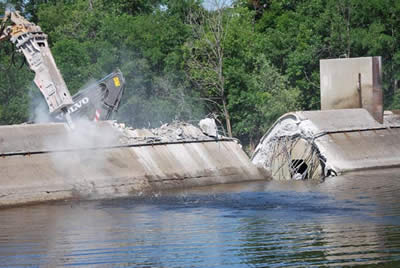People and wildlife have benefited from river’s recovery NRCM news release Augusta, ME – State, federal and local officials and conservation leaders gathered on the bank of the Kennebec River today to celebrate one of our nation’s most significant and successful river restoration projects. Ten years ago, the 160-year-old Edwards Dam was removed to restore Read More
Waters
Clean, healthy waterways are vital to our day-to-day lives. They help ensure safe drinking water, suitable habitat for fish and other wildlife, and recreational opportunities that make Maine a special place to live, work, and visit. NRCM has been working on clean water issues since we were founded in 1959 to protect the Allagash.
NRCM continues to advocate for clean and healthy waters across Maine. Read more news & blogs about our work to protect Maine's beautiful rivers, lakes, and streams.
Penobscot River Restoration Project to Boost Maine Economy, Restore Fish
Penobscot River Restoration Trust Awarded Funds to Remove Fish Passage Barriers Penobscot River Restoration Trust Today, the National Oceanic and Atmospheric Administration (NOAA) announced that it will invest $6.1 million through the American Recovery and Reinvestment Act to help rebuild the sea-run fisheries of Maine’s Penobscot River. A grant to the Penobscot River Restoration Trust Read More
Celebrating the 10th Anniversary of Removing the Edwards Dam
Remarks by NRCM Executive Director Brownie Carson Good morning and welcome to the 10th anniversary celebration of the removal of the Edwards Dam. Ten years ago, many of us who are here today stood on the opposite bank of the Kennebec to witness the beginning of a new chapter for this great river. On that Read More
Ten Years After Dam Removal Kennebec River Fish are Jumping Back
by Susan Sharon Maine Public Radio news story For centuries, dams that harnessed water power fueled factories around the Northeast. But the walled barriers prevented migrating fish from reaching their native spawning grounds. Water quality and entire ecosystems changed. Think about a dam on a river you know. Imagine what would happen if that structure Read More
Groups Call For Action to Open St. Croix River to Alewives
50 U.S. and Canadian Groups Petition International Body News Release McAdam, New Brunswick, Canada—Fifty organizations from the United States and Canada have called upon the International Joint Commission (IJC) to require that the St. Croix River be opened up for passage of alewives (river herring). The lead groups in this effort are the Atlantic Salmon Read More
NRCM Gives Award to Law Firms in Portland, D.C. for River Restoration Efforts
Augusta, ME – Two law firms, Verrill Dana in Portland, Maine, and Wiley Rein in Washington, D.C., have been awarded a 2008 Natural Resources Council of Maine Environmental Award for their tireless efforts to free the Sebasticook River by removing the Fort Halifax Dam in Winslow. For about 100 years, the Fort Halifax Dam at Read More
Penobscot River Restoration Trust to Buy Three Dams from PPL Corporation
by the Penobscot River Restoration Trust Old Town, ME: Today, on the banks of the Penobscot River in Old Town, Maine, at 11 a.m., partners in the Penobscot River Restoration Project will announce they are taking a major step forward in this historic effort to restore Atlantic salmon, American shad, river herring, and seven other Read More
Fort Halifax Dam Breached
by Colin Hickey, staff writer Kennebec Journal news story WINSLOW — Closure came to the controversy surrounding Fort Halifax Dam on Thursday morning with a few blows from a hoe-ram. The demolition machine, essentially an excavator with a hydraulic hammer, began to breach a portion of the 100-year-old hydroelectric facility at about 10 a.m., as Read More
Fort Halifax Dam Removed to Open Fish Passage in Sebasticook
On July 17, 2008, after more than 5 years of legal battles, FPL Energy Maine Hydro breached the Fort Halifax Dam in Winslow. Finally, this section of the river will flow freely again and native sea-run fish – striped bass, salmon, sturgeon, and shad – will be able to return to waters they have not seen Read More











